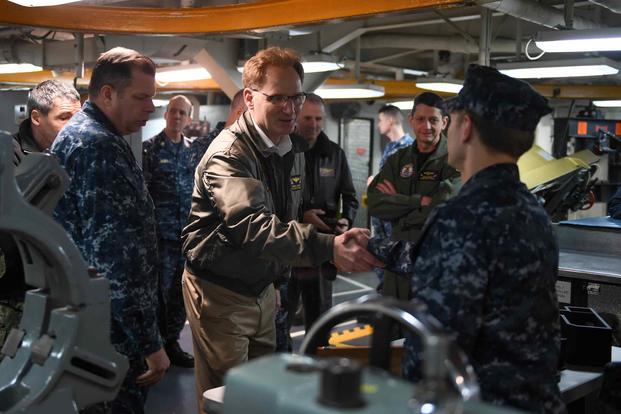The Navy's top civilian leader, who resigned from his position on Tuesday, told sailors and Marines they are justified in being angry with him after his poor use of words put a negative spotlight on the sea service.
Thomas Modly, who stepped down after mounting criticism over his disparaging remarks about a commanding officer who requested help for his virus-stricken ship, addressed the controversy in a Navy Department-wide message. He said it would be his "final vector," referencing the weekly directives he has issued to the fleet since stepping into the vacant Navy secretary role in November.
Modly said he will regret some of the comments he made on the aircraft carrier Theodore Roosevelt, which he flew thousands of miles to visit after ousting Capt. Brett Crozier, "for the rest of my life."
"The crew deserved a lot more empathy and a lot less lecturing-I lost sight of that at the time and I am deeply sorry for some of the words and for how they were spread across the media landscape like a wildfire," Modly wrote. "I had hoped to transmit a message of love, and duty, and mission, and courage in the face of adversity. Those words are in there, but they are now lost, because of me."
Related: Modly Resigns as Acting SecNav Amid Backlash Over Carrier Captain's Firing
Modly has drawn criticism from members of that crew, lawmakers, naval scholars and retired officers following his speech on the ship. He relieved Crozier of command on April 2 after a letter the captain wrote pleading with the Navy to evacuate his carrier as COVID-19 cases, the disease caused by the coronavirus, spread among the crew.
The Navy has more than 500 COVID-19 cases in the ranks, more than any other military service. More than 100 of those cases are on the Roosevelt.
Crozier sent his letter to at least 20 people, including some outside his chain of command. Modly blamed the captain for causing a panic among the crew and Roosevelt family members after a copy of the letter was published by the San Francisco Chronicle.
Navy leaders say they haven't determined whether Crozier sent the letter directly to the paper, but Modly during his speech on the carrier said the captain shouldn't have sent the information to anyone outside his chain of command.
"If he didn't think ... that this information wasn't going to get out into the public, in this day and information age that we live in, then he was either A, too naïve or too stupid to be a commanding officer of a ship like this," Modly said, according to a recording of the speech, which was obtained by Military.com.
He was later forced to apologize to the crew and Crozier for the disparaging remarks. Modly told sailors and Marines he was "terribly sad" about the media firestorm that followed his remarks on the Roosevelt being made public.
"It's my fault," he said. "I own it."
In his message to sailors and Marines, Modly said he understands the anger troops have toward him, though he hoped they would find "a glimpse of understanding, and hopefully empathy."
He said he had been monitoring all COVID-19 cases on ships closely and had personally spoken with commanding officers on every vessel with positive cases.
"When I walked on the quarterdeck of the TR I lost situational awareness and decided to speak with them as if I was their commander, or their shipmate, rather than their Secretary," he said. "They deserved better, and I hope that over the passage of time that they will understand the words themselves rather than the manner in which they were delivered."
Still, he said he doesn't know that if he was given the chance to redo it that he would do anything differently. Modly stressed that sailors and Marines must respect the chain of command.
Seeing the reaction to Crozier's relief, Modly added, "indicate to me that we have some work to do in this regard."
"You must pick up the mantle and fix this," Modly said. "... There is a proper, courteous, and respectful way to do this that we must adhere to, especially during a time of crisis."
Defense Secretary Mark Esper said on Tuesday that Modly resigned on his own accord, putting the Navy and sailors above himself so the Roosevelt and Navy could move forward.
Modly in his department-wide message, told sailors and Marines that he loved them all and that leading them was an honor and privilege.
But it's not only missiles that can "take us down," he added. "Words can do it too, if we aren't careful with how and when we use them."
"You know what to do," Modly said. "Take the helm. It's your ship now."
-- Gina Harkins can be reached at gina.harkins@military.com. Follow her on Twitter @ginaaharkins.
Read more: The Military May Be Sacrificing Too Much in the Name of Global Presence












